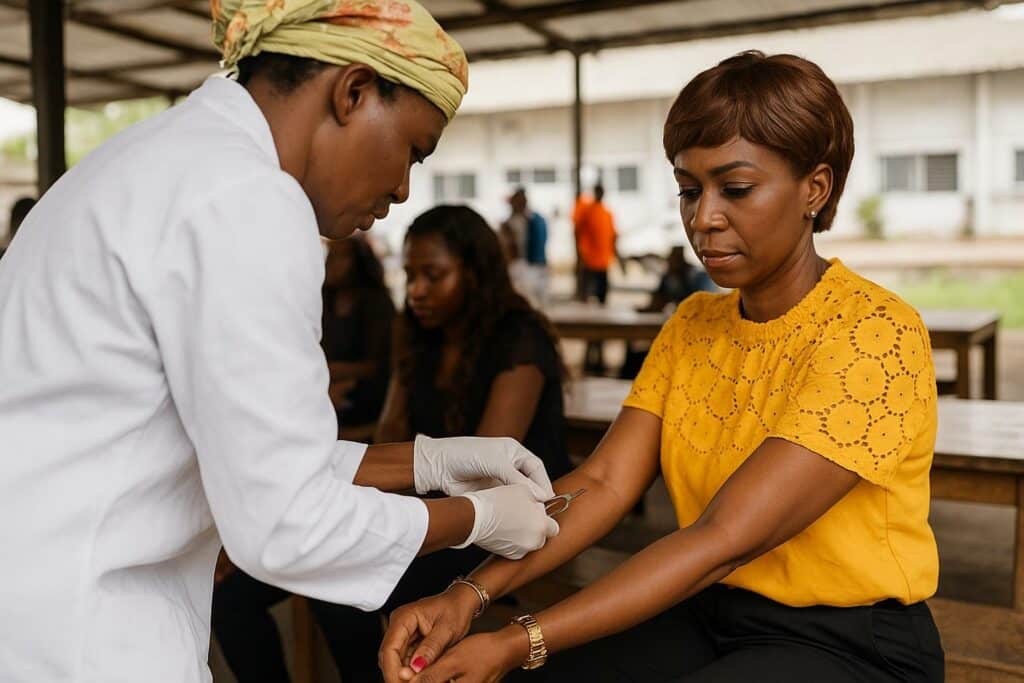A’Solidarity Day Sets an Ambitious Tone for Public Health
The rhythmic bustle of the Port Autonome de Pointe-Noire paused on 23 September 2025, only to resume in a more generous cadence. Under the banner of A’Solidarity Day, Africa Global Logistics (AGL) convened 1,500 colleagues from its subsidiaries – Congo Terminal and Terminaux du Bassin du Congo – for a blood-donation marathon simultaneously held in Pointe-Noire and Brazzaville. The move, applauded by medical practitioners on both banks of the Congo River, illustrates how a logistics group can leverage industrial discipline to advance a national health priority.
In concrete terms, the operation translated into 2,500 extra blood bags handed to the Centre national de transfusion sanguine (CNTS) only weeks after AGL had already donated medical consumables. Beyond statistics, the campaign signals a quiet but decisive shift: corporate solidarity is no longer a seasonal public-relations exercise; it is woven into the operational fabric of a leading logistics operator.
Strategic Alliance with CNTS Reinforces State Capacity
AGL’s communication department coordinated the drive with the Kouilou, Pointe-Noire and Brazzaville inter-departmental health directorates, ensuring that mobile collection units could be deployed directly on port platforms and administrative premises. For Dr Serge Oscar Mokono, Director-General of the CNTS, the impact is immediate: “The donation is crucial for patients requiring transfusions, notably accident victims, people with severe illnesses and those undergoing surgery. It is impressive to see so many AGL employees step forward.”
By channelling its organisational prowess into a public-interest partnership, AGL complements government action without supplanting it. The CNTS retains exclusive responsibility for screening, storage and distribution under Congolese health regulations, while the private operator streamlines the upstream logistics of collection. The combined structure enhances the Republic’s capacity to respond quickly to emergencies, in line with the authorities’ broader public-health strategy.
Workforce Engagement Turns Philanthropy into Routine Practice
Inside the hangars, ordinary work shifts gave way to meticulous donor screenings, registration tables and discreet recovery areas. Many employees queued in uniforms still flecked with portside dust, underscoring the spontaneity of their commitment. Christophe Pujalte, Regional Director for Congo and Angola, explained the philosophy: “At a time when certain nations are cutting their contribution to health, we have resolved to preserve human life through a dual gesture: first, supplying the bags, then filling them.”
Peer motivation played a decisive role. Team leaders rotated through the lines, encouraging colleagues to overcome initial apprehension. Human-resources managers later confirmed a surge in volunteerism, foreshadowing a sustainable culture of donation that transcends the symbolic 24-hour window of A’Solidarity Day.
Legal and Economic Lens on Corporate Social Responsibility
Congo-Brazzaville’s regulatory framework invites private entities to support community health initiatives while maintaining strict medical oversight. By assuming the cost of logistics and consumables yet leaving medical governance to public authorities, AGL adheres to legal boundaries that prevent the commercialisation of blood and respect the principle of voluntary, non-remunerated donation enshrined in national law.
Economically, the investment is modest compared with the social dividend. The opportunity cost of temporarily redeploying 1,500 staff is outweighed by enhanced employee morale, reduced absenteeism linked to solidarity programmes and an intangible reputational gain that can translate into stronger client confidence. The initiative thus exemplifies a virtuous circle: social responsibility underpins operational resilience, which in turn reinforces the group’s competitive positioning in Central Africa.
Prospects for a More Resilient Community Health Ecosystem
With the success of this second edition of A’Solidarity Day, stakeholders ponder the next chapter. Health officials in Brazzaville hint at replicating the corporate-public partnership model in other strategic sectors, from mining to telecommunications, where large workforces could serve as reliable donor pools. Meanwhile, AGL has signalled its intention to institutionalise quarterly drives, aligning its calendar with CNTS projections and thereby smoothing seasonal fluctuations in blood supply.
For the communities of Pointe-Noire and Brazzaville, the immediate benefit is tangible: operating theatres gain a buffer stock; families confront emergencies with greater confidence; and the national health narrative shifts from chronic scarcity to organised preparedness. In a subtle symbiosis, the Republic of Congo’s development agenda and AGL’s corporate ethos converge on a common denominator – safeguarding life.

